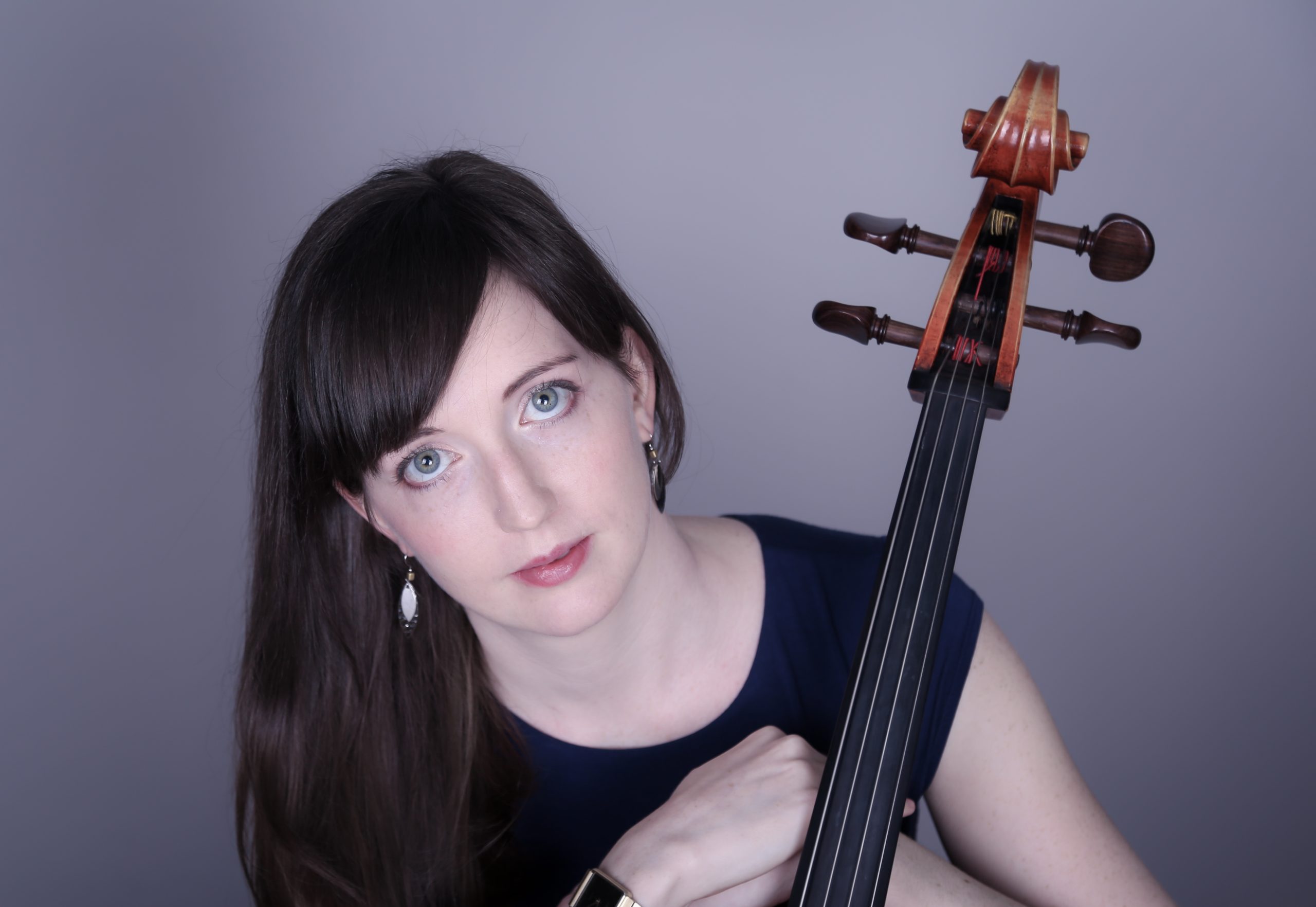The Hamilton Philharmonic Orchestra Composer Fellowship program was launched in collaboration with the Ontario Region of the Canadian Music Centre in our 18-19 Season. The program is aimed at connecting early career composers with professionals in the orchestral world to nurture and develop new skills through mentorship and the creation of a new work.
On October 21st, 2023 the Hamilton Philharmonic Premiered Kathryn’s work A Strange and Preposterous Affair conducted by James Kahane as the culmination of Kathryn’s fellowship with the orchestra.
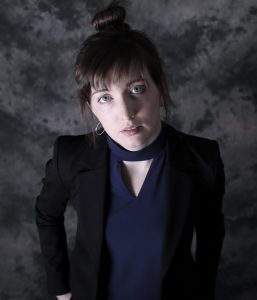
Joseph Glaser: Tell me a little bit about your background, how did you get into music?
Kathryn Knowles: While I really liked music from a young age, I originally wanted to be an actor. I auditioned and got in as an actor to an arts middle school in Kingston, but we also had to choose an instrument. I decided on the “big violin”, not knowing what a cello was until I was 12. I then chose a high school specifically because it had a strings program. Slowly over high school, my interest in acting got replaced by my interest in music and I had started taking private lessons in cello, piano, and theory. I was desperately trying to catch up with all the kids who had been doing music since they were young. I didn’t come to music from the traditional background, so it was a bit of an uphill battle for me. However, I was drawn to the challenge of music and that compelled me to continue my studies at university knowing that I had so much more to learn. By the time I got to university I had dabbled a bit in composition and knew that I liked it and wanted to learn more so I took as many composition courses as I could while still pursuing performance. It was wonderful to have the support during this time of both a private teacher in performance as well as composition. It became clearer and clearer that creating music was what interested me the most, so I decided to pursue a master’s degree in composition at U of T. I quickly learned that I wasn’t interested in the standard path of the composer, I needed practical experience to figure out what composition and being a cellist meant to me personally. I wanted to figure out how to marry those two pursuits together in a way that is true to my strengths as a musician, not just trying to fit in to a preformed model.
JG: You’ve had a career and success in multiple fields – as a composer, as a performer, and as a writer. Can you talk about what it’s like to work in those different fields, what are some differences and similarities? How do the disciplines inform each other?
KK: I definitely see a lot of crossover between my work as a poet and as a composer. The first time I combined the two was when I wrote a poem for an art song as part of a composition assignment in my undergrad, although some people suggested I should find an existing poem instead. I had been writing poetry since I was 7 – and I had even gotten a poem published in my local newspaper at that age! When the class read the poem, they all complemented me on the quality – which then put the pressure on me to write good music to set it to! I have always found it fairly natural for me to express myself through poetry. I think about poetry very musically, I’m drawn to writing things with a pleasing sound, cadence, and rhythm. Though I’ve never formally studied poetry, it’s always been a bit instinctive due to my music training.
My creative process, however, across disciplines is always the same. It starts with a tiny nugget of an idea. Sometimes this is something arbitrary, like maybe it’s just two notes that alternate. In my writing it’s similar, maybe it starts with a scene, or a line, or the idea of a magic power in the case of my work in the Fantasy genre. Once I have that small idea set, I go both forward and backwards from there and see where I get, and maybe cut and paste in between the two. Eventually the final picture emerges.
JG: Can you tell me a bit about the piece? How does the accompanying poem inform the music both from a compositional standpoint and from the audience perspective. Is the poem meant to be read alongside the music?
KK: 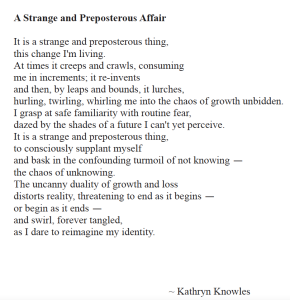 Over the last two years I’ve realized the strength of the connection between poetry and music for me and recognized that as something to nurture. I wrote a piece for accordion and electronics where I wrote a poem that I recited and sang as part of the electronic track. It was a really satisfying and fulfilling experience for me to write the poem first and then let the music come afterward. I have also done a series of poetry recitations with [pianist] Jialiang [Zhu] where I got to see first-hand how an audience responds to the poetry. I recited a wide range of poems, some which are more imagistic while others are more personal. It shouldn’t have come as a shock to me, but it did, but the audience responded very enthusiastically to the personal poems. I’ve now come to realize that that is my job as an artist, to be vulnerable and raw so that the audience feels something.
Over the last two years I’ve realized the strength of the connection between poetry and music for me and recognized that as something to nurture. I wrote a piece for accordion and electronics where I wrote a poem that I recited and sang as part of the electronic track. It was a really satisfying and fulfilling experience for me to write the poem first and then let the music come afterward. I have also done a series of poetry recitations with [pianist] Jialiang [Zhu] where I got to see first-hand how an audience responds to the poetry. I recited a wide range of poems, some which are more imagistic while others are more personal. It shouldn’t have come as a shock to me, but it did, but the audience responded very enthusiastically to the personal poems. I’ve now come to realize that that is my job as an artist, to be vulnerable and raw so that the audience feels something.
For this piece I decided to try working the other way around where I would write the piece first and then have the music inspire the poem. Though, of course, it’s not ever that simple. I had written to the point where the piece started to push back, and I wasn’t sure where it was going so, I then started writing the poem. I already knew the theme of the piece, i.e. change and my personal struggle with adapting to it. I worked through my feelings on the subject poetically which allowed me to work past my block in the music. I was then able to finish writing the music with the poem’s structure in mind. It ended up as a real back and forth, starting with the music, working through most of the poem, finishing the music, and then finishing the poem. At the premiere, I recited the poem on stage. Giving the audience access to the poem right before the performance allows the audience to connect with the music more because it’s easier to convey meaning with words than with music.
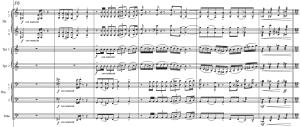
JG: What was the experience like working with the HPO?
KK: This is the first piece I’ve written for orchestra since completing my studies and the pressure is a lot different when there’s actually an orchestra at the other end of the composition process. Working with [HPO’s Composer-in-residence] Abigail [Richardson-Schulte] was great, she gave pertinent feedback and was very responsive to my needs. She erred on the side of giving less feedback in our sessions, in order to empower us to make our own artistic choices, but she was also ready to provide more whenever I asked her. The rehearsal process and concert themselves were stressful and intimidating, as it always would have been. However, the piece came together very nicely. I wasn’t prepared for the moment of realization I had of how much work [conductor] James [Kahane] had put into the piece. I was intimidated and thankful that this professional musician had been studying my score at the same time as Elgar and Britten and has really engaged with my work and come up with a plan to bring out the best in it. It was fun to come to the rehearsals and realize that by that point (several months after I had completed it) he knew my piece better than I did. It was nice to have that concrete evidence that someone else cared so much. Overall, it was a thrilling experience.
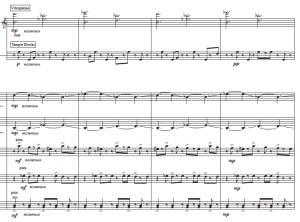
The fellowship as a whole has also been a wonderful experience. I was surprised that it started so much earlier than I thought it would. The zoom sessions started last season. They were well structured, being informative while also being a manageable amount in terms of time commitment. It was very interesting to learn about all the different people involved in the orchestra, how they work together as a team, how decisions are being made, and all the things that take place behind the scenes. It’s also not over for me yet. This Friday, I’ll be giving a “Talk and Tea” session with Abigail where I will give a presentation on Dvorak, which forced me to learn a little bit of his Cello Concerto – which is definitely not easy! In May, I’m going back to cover conduct Beethoven’s 9th Symphony with [HPO’s Music Director] Gemma [New] because I had specifically mentioned that I conduct a community string orchestra, so I have the opportunity to deepen my conducting skills as well. I’m particularly excited to receive mentorship from a female conductor.
JG: What are some takeaways you have from the experience?
KK: There’s definitely some nitty-gritty compositional technique lessons I’ve learned. In particular, I’m very chaotic in the way I write my scores and then tend to clean them up after I’ve finished writing. However, it then became really stressful to have to do the cleanup all at once, especially knowing that there is an orchestra waiting for the score to be delivered. The next time I do a composition, I’ll definitely be less chaotic so there’s less of a cleanup waiting for me at the end of the process. In general, I’ve taken away a lot about what works well for the HPO and how they’ve built up their community. There are a lot of lessons there that are relevant to my experience with my community orchestra and work as an arts administrator around arts management and arts governance. In the current climate, where many arts organizations are struggling, I have been eagle eyed in trying to find out what the HPO has been very successful at.

